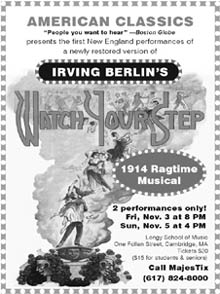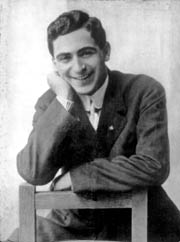 |
 |
| A donation will help the work of American Classics |
|
American Classics - Watch Your Step
Please click here to listen to selections from the show. "What a joy to turn back the clock to 1914 and see Irving Berlin's very first musical." (Beverly Creasey, Theatre Mirror) By 1914 Irving Berlin, then 26 years old, was already a well-known Tin Pan Alley songwriter, having produced such still-famous hits as "Alexander's Ragtime Band," "Everybody's Doin' It," and "When the Midnight Choo-Choo Leaves for Alabam.'" He had contributed a number of interpolations to Broadway shows, but had yet to write a complete score on his own. In fact, no songwriter considered to be strictly from Tin Pan Alley had written a complete Broadway score at that point. The producer of Watch Your Step, Charles Dillingham, was taking a double risk: not only was a Tin Pan Alley songsmith moving "up town," but the score would be completely in "ragtime," Berlin's specialty at that point in his career. Watch Your Step was a huge success, playing for over three years, and justifying Dillingham's risk of bringing Irving Berlin from Tin Pan Alley to Broadway. The original production of Watch Your Step toured to Boston twice, playing at the Colonial Theatre on Tremont Street both times, once in 1915 and then again in 1916. Watch Your Step was revived for two performances by American Classics in a concert presentation of both music and libretto on November 3 and 5, 2000 at the Longy School of Music in Cambridge, Massachusetts. For this production Sears and Conner returned to the original score, which was published by Irving Berlin himself as Irving Berlin, Inc., even though he was still part of Berlin, Waterson & Snyder. (A published vocal score was highly unusual in 1914, and Berlin did not publish another one until his show Louisiana Purchase in 1940.) In their restored performing edition, Sears and Conner retained the basic plot, which was, of course, nothing more than a framework on which to hang some wonderful Berlin songs. Berlin's raggy, tuneful score included one song which has remained a hit - Simple Melody, which was his first "counterpoint" song. It was the rage of the show, and its success gave Berlin a songwriting device that he would use throughout his career, up to the 1966 revival of Annie Get Your Gun. At this point in his career Berlin had hoped to write a "ragtime" opera. The Opera Parody of Act II is as close as he ever got to that dream. It does reflect a little-known facet of Berlin, which is that he was a lover of Grand Opera and was quite conversant with the operatic works popular at that time.
The version of the script used was drawn from late in the run, apparently after the famous dancing duo of Vernon and Irene Castle had left the show; research did not produce an Opening Night version of the script, though Harry B. Smith eventually did four versions. Watch Your Step was written as a star-vehicle type of show and had as its original stars the popular husband-and-wife society dancers Vernon & Irene Castle, the plot was adapted to make plenty of room for the Castles to dance, and the title of the show was changed to Watch Your Step to reflect their participation. Besides the Castles, the versions of the scripts Sears and Conner found featured such specialty acts as Dancing Children (in a scene about the Child Labor Laws which we cut in this production), a Burlesque Russian Ballet, and some unspecified ones to cover scene changes. The pre-production version, entitled Round the Clock, envisioned the inclusion of a lion tamer and a billiard sharp! "American Classics provided ensemble virtues. Benjamin Sears and Diana Rice offered expert, droll delivery of period dialogue, and there was some sweet singing from Mary Ann Lanier as the good girl and uninhibited high spirits from Valerie Anastasio and Roberta Gilbert as two women who are not quite so good. The others all offered moments of charm. [Pianist] Margaret Ulmer offered wit, rhythm, intelligence, and attractive tone. The whole enterprise was completely praiseworthy in intention - Bradford Conner and Sears did the research and created the performing edition. We wouldn't have been able to imagine Watch Your Step at all if it hadn't been for the dedication and skill of these people, so they earned our gratitude." (Richard Dyer, Boston Globe) – Benjamin Sears and Bradford Conner "It's more than time for a revival." (Iris Fanger, Boston Phoenix) Hear Selections from Watch Your Step
|
© American Classics • 70 Allston St., Boston, MA 02134, 617-254-1125 • AC@benandbrad.com |
 Watch Your Step was nominated in the "Best Ensemble" category for the 2000 IRNE (Independent Reviewers of New England) Award.
Watch Your Step was nominated in the "Best Ensemble" category for the 2000 IRNE (Independent Reviewers of New England) Award. Sears and Conner have recorded "Simple Melody," "Settle Down in a One-Horse Town," and "Move Over" on their CD,
Sears and Conner have recorded "Simple Melody," "Settle Down in a One-Horse Town," and "Move Over" on their CD,